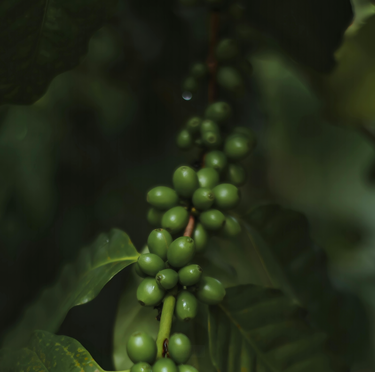Coffee is one of the world's most popular beverages and has been enjoyed in some form for centuries. While you may not think about it each morning when you brew a cup, the history of coffee is fascinating!
From its discovery to its current form as an international favourite, the story of coffee is ever-evolving. In this blog, we take you through the key moments in coffee history, from its origins in Ethiopia to its global presence today.
The Origins of Coffee
The origins of coffee are steeped in legend and lore, with the most enduring tale tracing its roots back to the ancient highlands of Ethiopia. Here, a humble goat herder named Kaldi noticed his goats frolicking with unusual vigour after consuming the red berries of a certain shrub.
Intrigued by this strange phenomenon, Kaldi decided to sample these berries himself. The energising effect he experienced marked the birth of the world's love affair with coffee.
This legendary shrub was none other than the Coffea plant, a species native to the region of Aromia in present-day Ethiopia. The origin of coffee beans can be traced back to these wild Ethiopian coffee forests, where coffee seeds grew in abundance and cherries were waiting to be discovered.
Coffee's journey out of Ethiopia
From these humble beginnings, coffee embarked on a journey that would span continents and centuries. A coffee bean was initially chewed for its stimulating effects, and the leaves of the plant were used to make a weak, tea-like beverage.
However, it wasn't until the 10th century that the Arabs, renowned for their innovative spirit, began roasting and grinding coffee beans, transforming them into the beverage we recognise today. This marked a significant milestone in the history of coffee, propelling it from a regional curiosity to a global sensation.
The Spread of Coffee to Europe
The journey of coffee to Europe is a tale of exploration, trade, and cultural exchange. The beverage made its European debut via the bustling trade routes of the Ottoman Empire, which had extensive connections with various parts of Europe. The first European coffee houses opened their doors
in Venice in 1645, offering a novel and exotic beverage to the curious.
The rise of European coffee houses
The introduction of coffee sparked a cultural revolution in Europe. Coffee houses, modelled after their Middle Eastern counterparts, began to spring up across the continent.
When a coffee house opened, it became the epicentre of intellectual discourse, fostering a culture of debate, discussion, and innovation. In fact, they were frequented by philosophers, writers, artists, and politicians, who found coffee a source of inspiration and a catalyst for conversation!
Drinking Coffee in the New World
The story of coffee in the New World is one of revolution and reinvention. Initially, tea was the preferred beverage in the American colonies. However, the imposition of the Tea Act and the subsequent Boston Tea Party in 1773 turned the tides in favour of coffee. Tea, once a symbol of comfort and hospitality, became a symbol of royal tyranny, and the colonists began to favour coffee, a preference that continues to this day.
The American Coffee Houses
The shift towards coffee drinking marked the beginning of a distinct American coffee culture. Despite its relative scarcity and high cost in the early days, coffee became an integral part of the American lifestyle. From the bustling coffee houses of New York to the cosy kitchens of rural homesteads, coffee has become a staple of American life.
The Rise of Coffee Plantations
The cultivation of coffee plants on a large scale began with the Dutch in the 17th century. Recognising the potential of coffee as a lucrative trade commodity, the Dutch began to cultivate the coffee plant in their tropical colonies. This marked the beginning of the coffee plantation era, transforming coffee from a wild shrub into a cultivated crop.
Brazil: The giant of coffee beans
The rise of coffee plantations brought about significant changes in the global coffee landscape. Brazil, with its vast tracts of fertile land and favourable climate, emerged as the leading coffee producer.
Today, Brazil accounts for one-third of the world's coffee production, making it the undisputed coffee giant. The country's dominance in coffee production is a testament to its optimal growing conditions for coffee seedlings and its commitment to quality and innovation in coffee cultivation.
Coffee in Modern Times
Today, coffee is the most widely consumed beverage in the world. It has become an integral part of our daily lives, with billions of cups enjoyed each day. As we continue to explore new frontiers in production and coffee consumption, we remain connected to our humble beginnings when we are drinking coffee.
The future of coffee: sustainability and innovation
The future of coffee lies in sustainability and innovation. In an increasingly interconnected world, coffee farmers and producers have to find ways to ensure that their practices are sustainable so as to protect the environment for generations to come.
At the same time, there is great potential for innovation in the areas of farming techniques, processing methods, and brewing technology. With advances in technology and a commitment to sustainability, the future of coffee is sure to be exciting.
Conclusion
Coffee is a truly remarkable beverage with an incredible history of discovery, exploration, and reinvention. From its humble origins in the wilds of Ethiopia to its global status today, coffee has captivated people throughout the centuries, making it one of the world's most beloved drinks.
Shop Single Origin Coffee Today
Here at Rave Coffee, we take great pride in sourcing and roasting single origin coffees from the world's best growing regions. Our mission is to bring you the highest quality coffee with full transparency in our sourcing practices.
So why not explore our selection of freshly-roasted coffee beans today? Whether you prefer light or dark roast, fruity or chocolatey notes, there's sure to be something for everyone.






